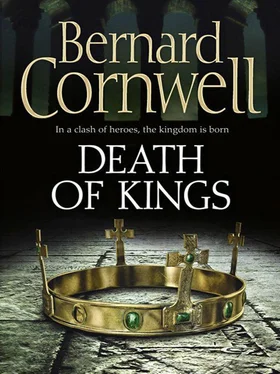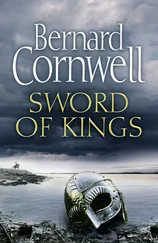Maybe here, maybe now, for I had abandoned the idea of destroying Cytringan’s feasting-hall and instead would attempt a foolish thing, but one that would have my name spoken all across Britain. Reputation. We would rather have reputation than gold, and so I left my men in a steading and rode down the river’s southern bank with just Osferth for company, and I said nothing until we came to the edge of a coppiced wood from where we could see the town across the wide river’s swirls. ‘Snotengaham,’ I said. ‘It was here I first met your father.’
He grunted at that. The town lay on the river’s northern bank and it had grown since I had last seen it. There were buildings outside the ramparts and the air above the roofs was thick with smoke from the kitchen fires. ‘Sigurd’s possession?’ Osferth asked.
I nodded, remembering what Beornnoth had told me, that Sigurd had laid up his war-fleet in Snotengaham. I also remembered Ragnar the Elder’s words that he had spoken to me when I was a child, that Snotengaham would be Danish for ever, yet most of the folk who lived inside the walls were Saxons. This was a Mercian town, right on the northern edge of that kingdom, yet for nearly all my life it had been ruled by the Danes and now its merchants and churchmen, its whores and its tavern-keepers paid silver to Sigurd. He had built a hall on a great rock outcrop in the town’s centre. It was not his main dwelling, which lay far to the south, but Snotengaham was one of Sigurd’s strongholds, a place he felt safe.
To reach Snotengaham from the sea a boat went up the great Humbre, then followed the Trente. That was the voyage I had made as a child in Ragnar’s Wind-Viper and, from the coppice on the southern bank, I could see there were forty or fifty boats drawn onto the far bank. Those were the ships Sigurd had taken south to Wessex the previous year, though in the end he had achieved nothing except to lay waste a few farmsteads outside of Exanceaster. Their presence suggested he did not plan another seaborne invasion. His next attack would be overland, a lunge into Mercia and then Wessex to take the Saxon land.
Yet a man’s pride is not just his land. We measure a lord by the number of crews he leads, and those ships told me Sigurd commanded a horde. I commanded one crew. I dare say I was as famous as Sigurd, yet all my fame had not translated into wealth. I should, I thought, be called Uhtred the Foolish. I had served Alfred all these years, and to show for it I had a borrowed estate, a single crew of men and a reputation. Sigurd owned towns, whole estates and led an army.
It was time to taunt him.
I talked with each of my men. I told them they could become rich by betraying me, that if just one of them told some whore in the town that I was Uhtred then I would probably die, and that most of them would die with me. I did not remind them of the oath they had taken to me because not one of them would need reminding, nor did I think any of them would betray me. I had four Danes and three Frisians in that group, yet they were my men, tied to me as much by friendship as by oath. ‘What we’re about to do,’ I told them, ‘will have men talking all over Britain. It will not make us rich, but I promise you reputation.’
My name, I told them, was Kjartan. It was the name I had used with Ælfadell, a name from my past, a name I did not like, the name of Sihtric’s foul father, but it would suffice for the next few days, and I would only survive those days if none of my men revealed the truth and if no one in Snotengaham recognised me. I had only met Sigurd twice, and both times briefly, but some of the men who had accompanied him to those meetings might be in Snotengaham and that was a risk I had to take. I had let my beard grow, I was wearing old mail, which I had allowed to rust, and I looked, as I wished to look, like a man on the edge of failure.
I found a tavern outside the town. It had no name. It was a miserable place with sour ale, mouldy bread and worm-riddled cheese, but it had sufficient room for my men to sleep on its filthy straw, and the tavern’s owner, a surly Saxon, was satisfied by the small amount of silver I gave him. ‘Why are you here?’ he wanted to know.
‘To buy a ship,’ I said, then told him we had been part of Haesten’s army and that we had become tired of starving in Ceaster and only wanted to go home. ‘We’re going back to Frisia,’ I said, and that was my tale and no one in Snotengaham thought it strange. The Danes follow leaders who bring them riches, and when a leader fails, his crews melt away like frost in the sun. Nor did anyone think it strange that a Frisian would lead Saxons. The crews of the Viking ships are Danish, Norse, Frisian and Saxon. Any masterless man could go Viking, and a shipmaster did not care what language a man spoke if he could wield a sword, thrust a spear and pull an oar.
So my tale was not questioned and, the day after we reached Snotengaham, a full-bellied Dane called Frithof came to find me. He had no left arm beneath the elbow. ‘Some Saxon bastard cut it off,’ he said cheerfully, ‘but I sliced off his head so it was a fair exchange.’ Frithof was what a Saxon would call the Reeve of Snotengaham, the man responsible for keeping the peace and serving his lord’s interests in the town. ‘I look after Jarl Sigurd,’ Frithof told me, ‘and he looks after me.’
‘A good lord?’
‘The very best,’ Frithof said enthusiastically, ‘generous and loyal. Why don’t you swear to him?’
‘I want to go home,’ I said.
‘Frisia?’ he asked, ‘you sound Danish, not Frisian.’
‘I served Skirnir Thorson,’ I explained. Skirnir had been a pirate on the Frisian coast and I had served him by luring him to his death.
‘He was a bastard,’ Frithof said, ‘but had a pretty wife, I hear. What was his island called?’ The question had no suspicion in it. Frithof was an easy, hospitable man.
‘Zegge,’ I said.
‘That was it! Nothing but sand and fish shit. So you went from Skirnir to Haesten, eh?’ he laughed, his question implying that I had chosen my lords badly. ‘You could do a lot worse than serve the Jarl Sigurd,’ Frithof assured me. ‘He looks after his men and there’ll be land and silver soon.’
‘Soon?’
‘When Alfred dies,’ Frithof said, ‘Wessex will fall into pieces. All we have to do is wait and then pick them up.’
‘I have land in Frisia,’ I said, ‘and a wife.’
Frithof grinned. ‘There are plenty of women here,’ he said, ‘but if you really want to go home?’
‘I want to go home.’
‘Then you need a ship,’ he said, ‘unless you plan to swim. So let’s go for a walk.’
Forty-seven ships had been pulled from the river and were now propped by oak shafts on a meadow close to a small shelving cove that made launching and recovering easy. Six other ships were floating. Four of those were trading boats, and two were long, sleek war boats with high prows and sterns. ‘ Bright-Flyer ,’ Frithof pointed to one of the two fighting ships afloat in the river, ‘she’s Jarl Sigurd’s own craft.’
Bright-Flyer was a beauty with a flat sleek belly and a high prow and stern. A man was squatting on the wharf and painting a white line along her topmost strake, a line that would accentuate her sinuously threatening shape. Frithof led me down to the timber wharf and stepped over the boat’s low midships. I followed him, feeling the small shiver in Bright-Flyer as she responded to our weight. I noted her mast was not on board, there were no oars or tholes, and the presence of two small saws, an adze and a box of chisels showed that men were working on her. She was afloat, but she was not ready for any voyage. ‘I brought her here from Denmark,’ Frithof said wistfully.
Читать дальше
Конец ознакомительного отрывка
Купить книгу












